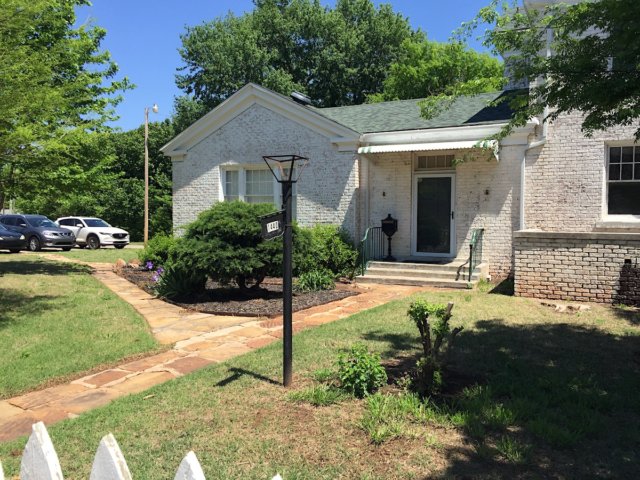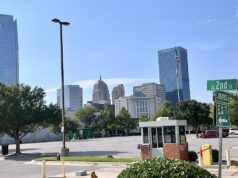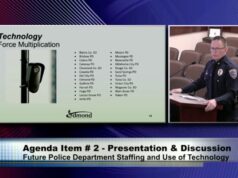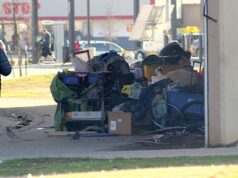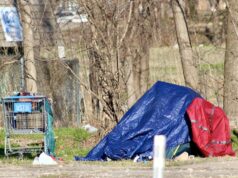
Differing views on what should happen to a northeast Oklahoma City building more than 100 years in age will collide at a Friday morning meeting of the Capitol-Medical Center Improvement and Zoning Commission.
A somewhat obscure entity to many Oklahoma City residents, the commission works toward the “orderly development of the Capitol-Medical Center Improvement District,” according to its website.
That district extends from Northeast 8th Street to Northeast 21st Street between Stiles to Lottie avenues.
A white brick house of historical significance in OKC’s black community, the Brockway Center falls within the commission’s purview. The property at 1440 N. Everest Ave. is now owned by the CARE Center, which has applied to demolish the old structure and build a 5,800-square-foot office building in its place.
CARE began in 1991 as an organization that advocates for children who have been the victim of child abuse, and staffers work to prevent future abuse through education initiatives.
CARE purchased the Brockway Center building in 2018 for $350,000, according to the Oklahoma County Assessor’s website.
Brockway Center has a long history
Built in 1915, the Brockway Center has been home to a grandparents academy operated by Langston University and also functioned as a private home.
For years, it housed the Oklahoma City chapter of the National Association of Colored Women’s Clubs.
In February, Oklahoma City Ward 7 Councilwoman Nikki Nice proposed a resolution to offer support for preserving the existing building.
The Brockway Center was a haven for minorities and women in the early 20th century, according to Maroon Society volunteer Liv Tegenu. That organization works to preserve history, according to its website.
“The women that founded the building, they set it up for anti-lynching activities and women’s rights,” Tegenu said. “They operated by lifting others up. This was a place during segregation where people could go. It was a safe place.”
The property has changed hands since it was sold by the NACWC’s city foundation in 2011.
“When they sold it, they had been told that it was a historical building and that would prevent it from being torn down,” Tegenu said.
But no official historic designation appears to exist, and the Oklahoma City Federation of Colored Women’s Clubs entered into a memorandum of understanding with the CARE Center on March 11.
It reads, in part:
The ladies of the OCFCWC will withdraw their formal objection to demolition of the historic Brockway Center structure and continue their efforts in collaboration with the CARE Center through assistance with education to the public of the mission of the CARE Center.
Subject to availability, the CARE Center will permanently provide a designated space at no charge within the new facility for OCFCWC use for meetings (…) and community service activities which will include a display of historic markers regarding the OCFCWC in a room dedicated to the history of the Federation; a marker at the curb of the new facility with a picture of the Brockway Center building (….)
Demolition, new construction proposed
CARE chief executive officer Stacy McNeiland told the Oklahoma Gazette earlier this year that the building needs extensive work.
“You start to walk through the house, and an engineer’s pointing out, ‘See how your foundation’s dipping, see how this isn’t to code, see all these problems — you have asbestos, you have bad plumbing, you have bad electrical,'” McNeiland told the Gazette. “So the engineer and architect at that point said ‘Your best solution is to demolish and to build from the ground up.'”
Nice responded to a message seeking comment after the initial publication of this story.
“The home is in good condition. There were two families that lived there after the ladies sold the home,” Nice said. “So this conversation is nothing new. The history of the women speaks for itself and should be honored.”
McNeiland also responded to a message seeking comment after this story had published.
“The CARE Center was not aware of the history of the property when when we purchased it,” McNeiland said. “When we learned about its past use, we immediately started thinking of ways to work with the women of the Brockway Center, honor their legacy and help tell their story. We are thrilled they have agreed to join in our plans for a new building.”
Tegenu said other community organizations have supported preserving the Brockway Center.
“My hope and wish is they recognize they’re making a bad decision and that they will do the right thing,” she said.
8:15 a.m. Friday meeting agenda
 Loading...
Loading...
(Update: This story was updated at 5:50 p.m. Thursday, April 25, to include comment from Nice. It was updated again at 8:30 p.m. to include comment from McNeiland.)









